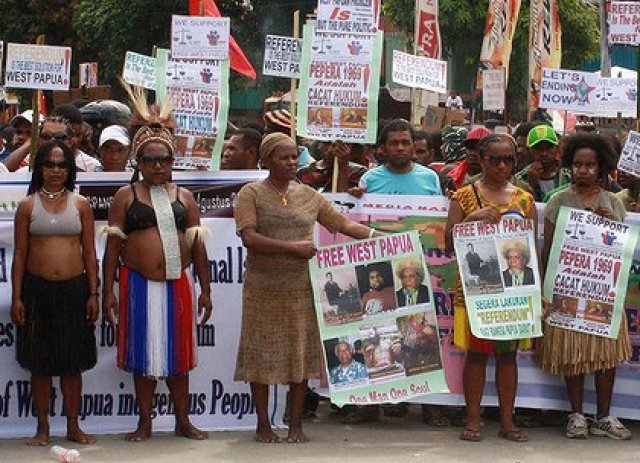
Strike action by thousands of workers at the notorious Grasberg gold and copper mine in West Papua since September 15 has brought operations to a halt, despite attempts to stop the strike.
The mine is the largest and most profitable in territory controlled by Indonesia and has a long association with human rights abuses. It is owned by US mining giant Freeport-McMoRan and British-Australian company Rio Tinto.
West Papua has been occupied by Indonesia for nearly five decades, despite strong demands from Papuans for self-determination.
The Indonesian military, backed by countries such as Australia and the United States, uses repression against the Papuan freedom movement and in defence of the interests of the corporations that operate in the area.
Freeport representatives claimed the workers’ wage demands were too high, despite the company making $30 million a day in July. Workers have demanded $7.50 an hour, closer to the wages Freeport pays its workers in other countries and up from their current wage of $2.10 an hour.
The strike has been marred by deaths and intimidation of the striking workers. Police failed to follow through on their threat to break the strikers’ blockade on November 1.
All-Indonesian Workers Union (SPSI) secretary Albar Sabang told the Jakarta Globe on October 31 that police had mobilised armoured vehicles against the strikers.
This followed the shooting death by police of a worker at a rally on October 10. Union leaders have also reported death threats.
Six people have been killed in ambushes on the road to the mine since October 14, and three police officers narrowly escaped the same fate on October 26, Hidup Biasa said on October 29. It remains unclear who carried out these attacks.
The role of the Indonesian police has been under extra scrutiny, after they publicly admitted on October 28 what has been an open secret for years — they have received tens of millions of dollars from Freeport to provide “security” for the Grasberg mine.
This “security” consisted of violent repression of local people who stood in the way of the company’s destructive practices and of mine workers who protested against exploitation.

Indonesian Corruption Watch police received $79.1 million from Freeport between 2001 and 2010, the Jakarta Post reported on November 1. One of Freeport’s own reports said $10 million was paid for “government-provided” security operations in 2009, the Jakarta Globe said on October 29.
National police chief Timur Pradopo said the payments were just “lunch money”, and that it was normal for police to receive extra payments in the course of duty, the Globe said.
The payments illustrate the strong connections between security forces, the Indonesian government and foreign companies in their repression and exploitation of the West Papuan people.
The biggest challenge to this system is the Papuan independence movement.
The murderous attack on the Papuan national conference by Indonesian security forces on October 19 shows how much they view this as a threat.
Six people were killed and hundreds of others injured and arrested after security forces attacked the crowd after the conference. Thousands of Papuans had attended the conference to discuss the movement for independence from Indonesia.
Western governments have remained largely silent on the attack. Mainstream explanations for this are the West simply does not want to offend or embarrass its ally, Indonesia. However, this hides their complicity in Indonesia’s activities.
The Indonesian military receives millions of dollars of funding and training from countries like the US and Australia, which goes directly into repressive activities.
Despite a US law that banned training of military units with a history of human rights violations, secret US cables from their embassy in Jakarta released by WikiLeaks show the US government was keen to find ways around the bans, to fund and train Indonesia’s military and police.
However, Indonesian officials were reluctant to take part due to resentment over the exclusion of the notorious special forces unit Kopassus.
The US restarted funding and training of Kopassus in July last year, claiming Kopassus had reformed and no longer violated human rights.
Many of the Jakarta embassy cables tried to downplay or ignore the human rights abuses of Indonesian security forces in order to justify US re-engagement with them as part of the “war on terror”.
An embassy cable from October 19, 2007, said: “The special military forces play an essential role in Indonesia’s ability to protect US official, civilian and commercial interests here.”
The cable, written by Ambassador Cameron R Hume, argued strongly that: “The time is right to resume gradual engagement with Kopassus”.
Hume said: “Our interests depend on these forces and their police counterparts for protection” from terrorist threats and “violent demonstrations”.
However, a 2009 Human Rights Watch report detailed cases of brutal, arbitrary attacks and torture committed in West Papua.
A March 22, 2010, article by Allan Nairn in the Nation said Kopassus had committed a series of assassinations of political activists in Aceh in 2009.
The Australian and US governments also fund and train “anti-terrorist” unit Detachment 88. The unit was set up after the 2002 bombing in Bali with the backing of the Australian and US governments.
Detachment 88 has been implicated in human rights abuses in West Papua and other parts of Indonesia. The unit was forced to withdraw from the Maluku region last year after coming under pressure over its brutal treatment of independence activists.